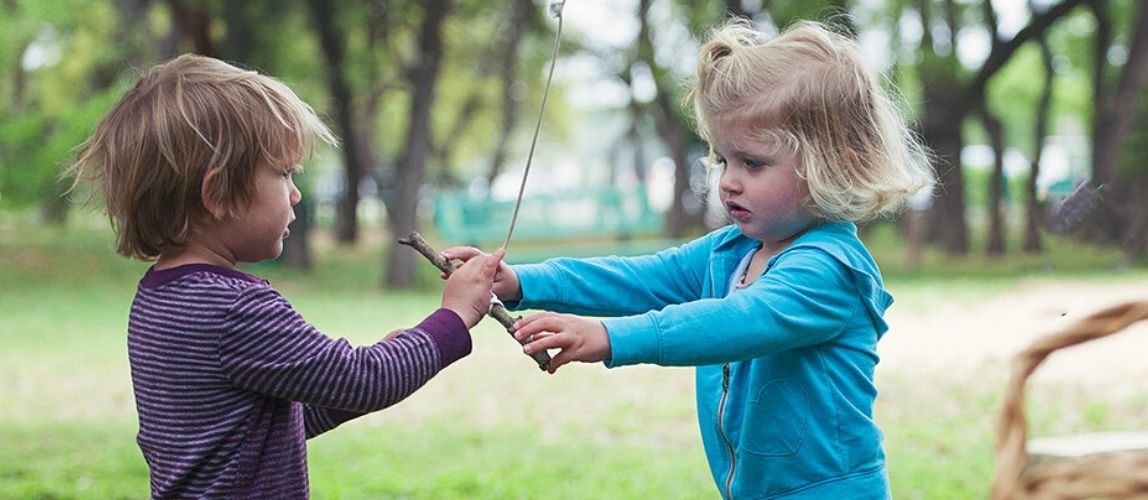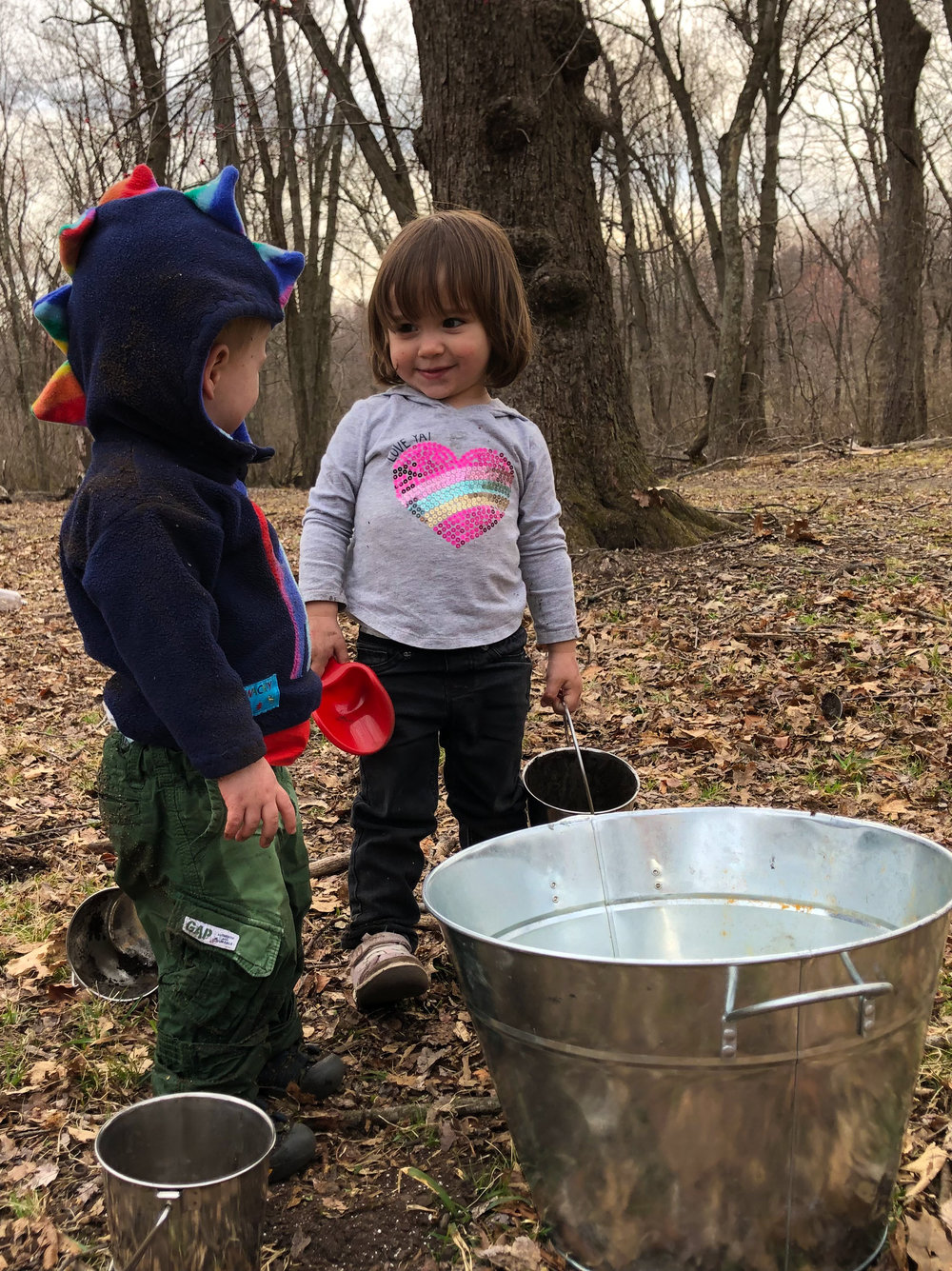After our recent Facebook Live discussion about empathy, I noticed a comment that had gone unnoticed when we were “live.” It is a marvelous question and one that parents and educators alike wonder.
“At what age should I expect a child to say, ‘I’m sorry.’”
My immediate instinct was, “The day your child suggests it as a way to make a situation better.”
Before I replied to the comment, I searched through my bookshelves and poked around online, for thoughts about the “Say you're sorry” approach. If you want to explore the age-old to sorry or not to sorry question, there are quite a range of articles and even books that drill into the issues. Plus, it's hard to feel your way through it! We all want our kids to shine socially, to be kind and to be perceived by the world as the love bugs we know they are (most of the time).
Taking an Empathy Lens
Since this spring is our season of empathy at Tinkergarten, I couldn't help but frame my thinking around what approach would most help kids develop empathy? The more I thought about empathy, the simpler it all seemed.
Photo: Jennifer Johnson, Cahoots Media
In those moments when we see our child does something that hurts or bothers another child, of course, we want to ask them to say, “I’m sorry.” Perhaps, we want the other child to feel better (not to mention the worried parent of the said child). Maybe we want our children to feel and show the world that they feel remorse. We all want our children to learn customary behavior at some point, and who does not seek a sense of closure to an unpleasant event. And, yes, we all want to seem as if we are on top of this parenting business. Saying “sorry” seems a tempting way to hit all of these.
Rushing to sorry risks learning.
What’s missing from this list, though, is a desire to help our kids develop real empathy and a deep sense of how to care for another person. That goal kind of trumps all of those other desires.
If we rush right to, “Say you’re sorry,” we skip right over some really valuable learning opportunities. First, we zoom past the moment in which our child could come to understand that their actions caused an emotional experience for another person. This is a huge piece of the puzzle, and it is the foundation on which a real, genuine “I’m sorry” actually rests.
Second, if we rush to resolution, kids miss the chance to slow down, study the other person’s response, and learn about emotions. What is their face telling me? What are their actions and words telling me? Just how have my actions made them feel? This is the perfect way to learn affective empathy—our capacity to sense the feelings of others.
Even worse, if we push a child to say sorry before they have processed the moment, and before they can feel genuinely sorry, we ask our child to act in a way that doesn’t reflect how they are feeling inside, which is both confusing and counterproductive to kids developing affective empathy.
But how can we react when we’d LOVE to ask our kiddos to say “I’m sorry?”
Although you never really implement any multi-step process perfectly as a parent, this general approach has helped us support our kids in these moments:
-
Slow down and name the action: As soon as you clue in that there was an incident, keep as calm as you can as you ask your little one to engage with you, then name the action that your kiddo took. It could sound something like, “Hey pumpkin, slow down for a minute. I saw that you just hit Amara with a shovel. Is that right?” If you didn’t quite see it, ask, “Lovebug, can you tell me what just happened with you and Amara?” Continue to ask questions to help your child focus on the actions they took.
-
Was there a reason/more to the story? Leave open the possibility that there was a reason, but don’t be thrown if there wasn’t one—at least not a good one. “Do you know why you hit Amara with the shovel?” Honor the reason, if there was an understandable one. Either way, establish that it was not a good choice to do that, reason or no reason.
-
How did it make the other person feel? Follow up to explore how the action impacted the other person. Ask, “How do you think that make Amara feel?” Be patient and give time for your kiddo to think and respond. If needed, follow on with a question that supports the process, like, “What can we tell from Amara’s face?” If your child struggles to answer, suggest some added thoughts. “I see that Amara is crying and she has a frown on. That makes me think that Amara feels sad.”
-
That’s not okay. What can we do now? Establish that we can’t leave friends this way. “It’s not okay to leave friends feeling this way because of something we did. What could you do to make Amara feel better?” See what your child suggests. If helpful, follow up with more supportive questions like, “What would make you feel better?” If they are able to think of another person’s preferences, ask, “What might make Amara happy?” If needed, suggest something that will come naturally to your child. Offer Amara a special or favorite object. Go stand by Amara. Tell Amara a joke, etc.
-
How can we avoid this? Hatch a plan to try to stop this happening again. For example, “Let’s give that shovel more space next time.” And, if needed, add some consequences. “If we can’t make sure that shovel doesn’t hit any more friends, we’ll need to put the shovel away. Understand?”
-
Model genuine “I’m sorry’s” yourself. Even if your child is not ready to produce their own, authentic “I’m sorry,” they are ready to watch and learn from your example. Slow down and take time with your sorries, and your kiddo will be learning for the future when you do.
-
Latte for you! Then, give yourself loads of credit, a pat on the back, a latte—whatever it takes. It’s tough to see your child make social choices you wish they would not make. But, every interaction they have, the easy and the challenging, are opportunities for them to learn. The more you let them fully experience, the better able they will be to form deep, connected relationships.
Find what works for you.
At the end of the day, the way we parent happens in our own, personal contexts—informed by a beautiful mixture of culture, community and family history. It might be that not saying sorry in a moment like this is just a non starter for you. We honor and respect however each of us want to address these moments and, no matter what you decide, simply encourage each of us to slow down, remember our children are still developing the capacity to feel and say, “I’m sorry,” and capture these snafus as marvelous, teachable moments!

